Keyword Research is the most crucial step of SEO, if you do not do it correctly, that means you waste your time and resources. One thing to be noted is that no one doing it intentionally, it happens just because of a lack of information, well according to researched data from Ahrefs, around 90.635% of websites do not get traffic from Google. and that’s a big number. To think your website is one of those is just like a nightmare, or feeling like standing alone on the island, waiting for help.
Well, in this article we have shared all the information about keyword research, what it is how to do it correctly. So, you can survive in the ocean of the internet.
What is keyword:
Keywords are the particular phrases or words that give the idea of content. in the case of online searches, keywords play an important role. Through it, users find relevant information on search engine result pages (SERPS).
Nature of Keywords
On search engines, users mostly enter two kinds of queries, that is long-tail keywords and short-tail keywords. Long tail keywords are more than two to three words. These are specific intent keywords, which means the user knows what he wants. Suppose he enters “best leather jacket for men”. This shows his intent is clear that he wants to buy it.
The second kind of keyword is the short-tail keyword. These are one to two words. General queries, mean users are not sure while searching for it. suppose the user searches” jacket” or “leather jacket”, here user’s intent is not clear.
Now let’s drive towards keyword research because once you know about keywords and their nature. The other question is what is keyword research and how to do it correctly?
What is keyword research
Keyword research is the process of finding and analyzing particular keywords or phrases that users mostly enter into search engines when they are looking for information, services, or products on a specific topic or industry. The main purpose of keyword research is to identify high-value keywords that have high search volume, relevancy, and competition, this allows businesses and website owners to optimize their business marketing by attracting targeted traffic and improving search engine rankings.
Suppose, a retailer has a shop for jackets. Now with the help of paid and unpaid tools of keyword research. He gets the idea of which kind of queries people search on Google for the product, he is selling.
Why keyword research is important
Keyword research gives the path to attract the organic audience on the websites. It helps businesses to grow organically and get the profile that their audience wants. It also helps the owner to optimize their products according to the user’s needs.
Suppose the owner of the cat and dog tools provider, wants to know which kind of tools is most in demand for cats, then he gets the idea through keyword research tools. This will also help to increase the conversion. Additionally, Google considers keyword relevance while ranking the website, so if the owner’s shop add all those tools in which are in demand, then there is high possibility of its ranking.
Types of keywords
Informational keywords
Informational keywords are those keywords that give information about specific searcher queries. the search intent of the user is basically to get information about a particular thing. Most of the time searched queries of informational keywords are started from WH questions. Suppose the user wants to know about cheesecake or pancake. Then he enters how to make a cheesecake or the word cheese cake.

Now, the question is, are informational keywords important for commercial websites? The answer is “yes”, even though they do not directly make any coinversion but indirectly they help to drive the audience toward conversion.
Suppose, your website sells “pillows with holes” Now you let the audience know about what is pillow with a hole is, how it works, and what benefits you have if users buy it. Moreover, informational keywords are the first step of the marketing funnel which is awareness. let the audience know about your product.
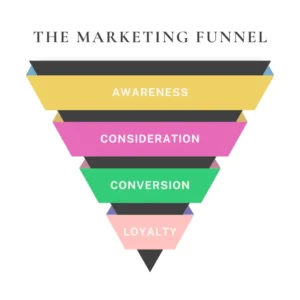
Navigational keywords
Navigational keywords are those keywords in which a brand or business name is written. In this scenario, the user already knows what he searching for. Mentioning the brand name in the search engines helps to go to the specific page.
Suppose the user enters the queries “YouTube” or “spixDigital solution services”, all these keywords are navigational keywords. Moreover, these keywords contain organic traffic and help increase the website’s ranking.
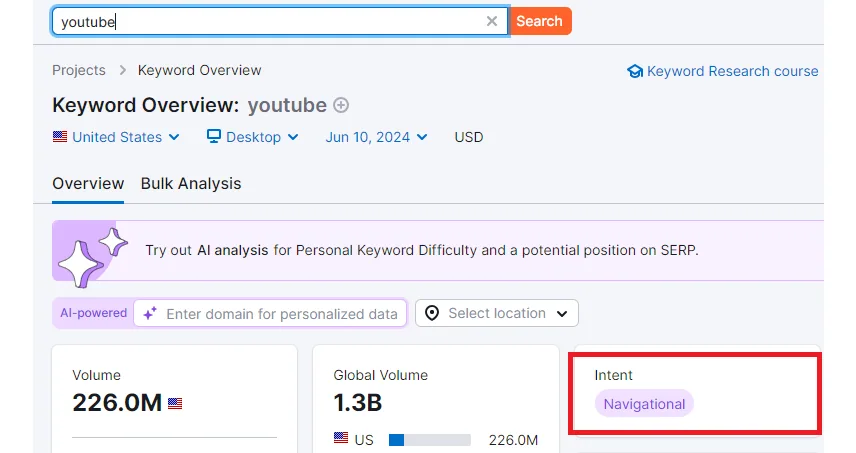
Commercial keywords
Commercial keywords are the stage on which buyers come before doing any kind of transaction, in this stage, buyers look for different information about the particular thing or services that they intend to buy. Businesses and brand owners can convert these buyers from commercial to transactional by giving them information about their brand through articles, and marketing.
Moreover, these keyword users mostly look for a particular product at a lower price or for a discount, or may they check the review of the same product from a different brand.
- Foundation cream of Mac vs Huda beauty.
- Home décor at a cheap price.
- Which generation of laptops is better for gaming?
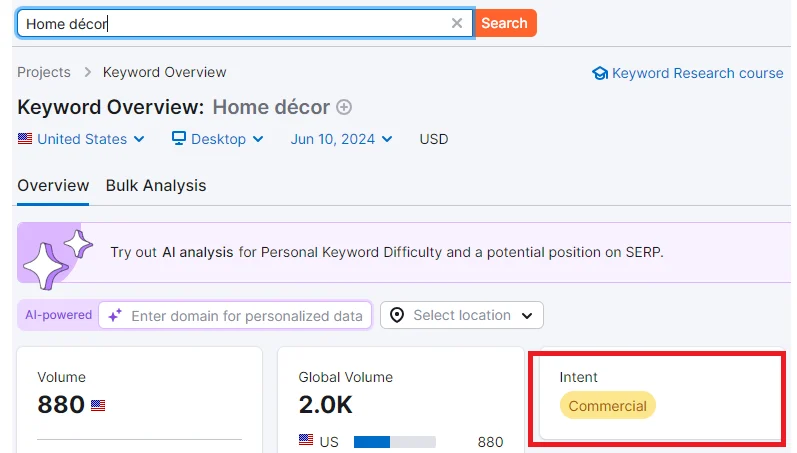
Transactional keywords
Transitional keywords contain a strong intent of buying the product and services. This is the last stage of the marketing funnel, users do this kind of search when they have a clear intent to buy something. When the user searches “best jackets for men” then he shows the intent to buy it
Keywords like:
- Sale of home décor.
- Price of Coffee machine on Amazon
- Lamps shop near me
All of these keywords show that the user is really into buying something and is ready to do some transaction. These keywords are also known as buyer keywords.
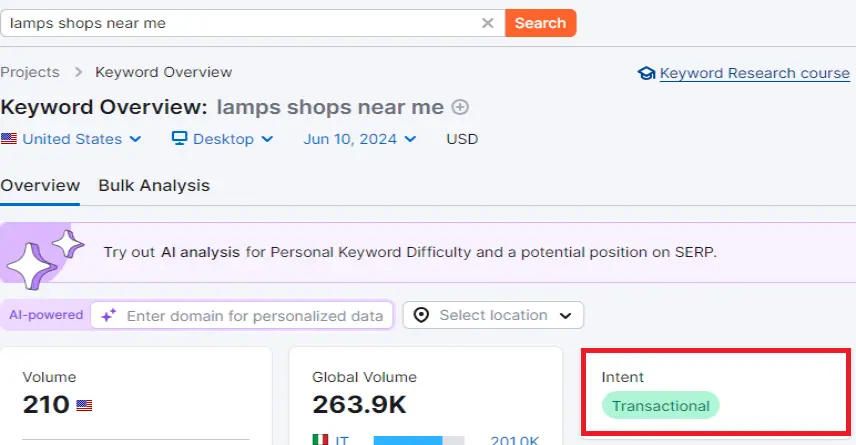
8 steps for the beginners to find keywords
For SEO, keyword research is crucial for optimizing your website’s content to rank higher in search engine results pages (SERPs). Here’s a step-by-step guide to finding keywords for SEO:
1. Understand Your Audience
Understand your audience and their search intent, what they search, and how they search, these things are crucial to know. Knowing your audience helps you to strategies your keywords in a manner that matches the needs of target users.
2. Brainstorm Seed Keywords
Brainstorming is the process in which all those keywords are extracted, that match what the SEO experts looking for. In short, It’s a list of keywords that are related to your brand, products, or services.
3. Use Keyword Research Tools
Keywords search tools help you to find out, those keywords that are searched by the target users. Some tools are paid and some are unpaid, Google Keyword Planner, SEMrush, Ahrefs, Ubersuggest, or Moz’s Keyword Explore. All of these tools generate keywords and also give you proper information about keyword difficulty, competition, search volume, and keyword metrics.
Tip for new website:
If you have a new website target low to medium-competition keywords, and also use Google search autoplay to know about those queries that searchers enter in the search box. That will give you those keywords that your competitors don’t have.
4. Analyze Keyword Metrics
Keyword metrics are the quantitative measurements of the effectiveness and performance of keywords in search engine optimization SEO. keywords metrics pay attention to metrics like search volume, keyword difficulty (competition), cost-per-click (CPC), and trend data. Aim for keywords with a balance of decent search volume and manageable competition, also focus on short-tail keywords and long-tail keywords. It provides you insights into keyword relevancy, popularity, competition, and the impact of a particular keyword on driving traffic and achieving the desired result.
5. Long-Tail Keywords
If you have a new website to rank target long-tail keywords, those keywords have two to three words, and they have low keyword competitors, then you have a place to rank your website and attract qualified organic traffic. Because long-tail searchers are more specific about what they looking for.
6. Consider User Intent
One thing to always keep in mind is don’t give people what you want, give them something that they want. So, same as in keyword searching. Always prioritize user intent, because this thing will let you rank fast. Understand their notion, their problems, and the information they looking for. By aligning your concern with the user’s need let both of you be on the same page.
7. Competitor Analysis
Competitors analysis gives you insights into the nature of your target audience, their queries, their concerns, and also the keyword strategies of your competitors on which they rank on search engine research pages(SERPs). All of you can do this with the help of paid tools of SEMrush and Ahrefs.
8. Organize Keywords
Create a file and organize your keywords by making the categories of it into relevance, and search intent. And further you can divide them into exact matches and phrase matches. By making a file it becomes easier for you to create content on these keywords one by one.
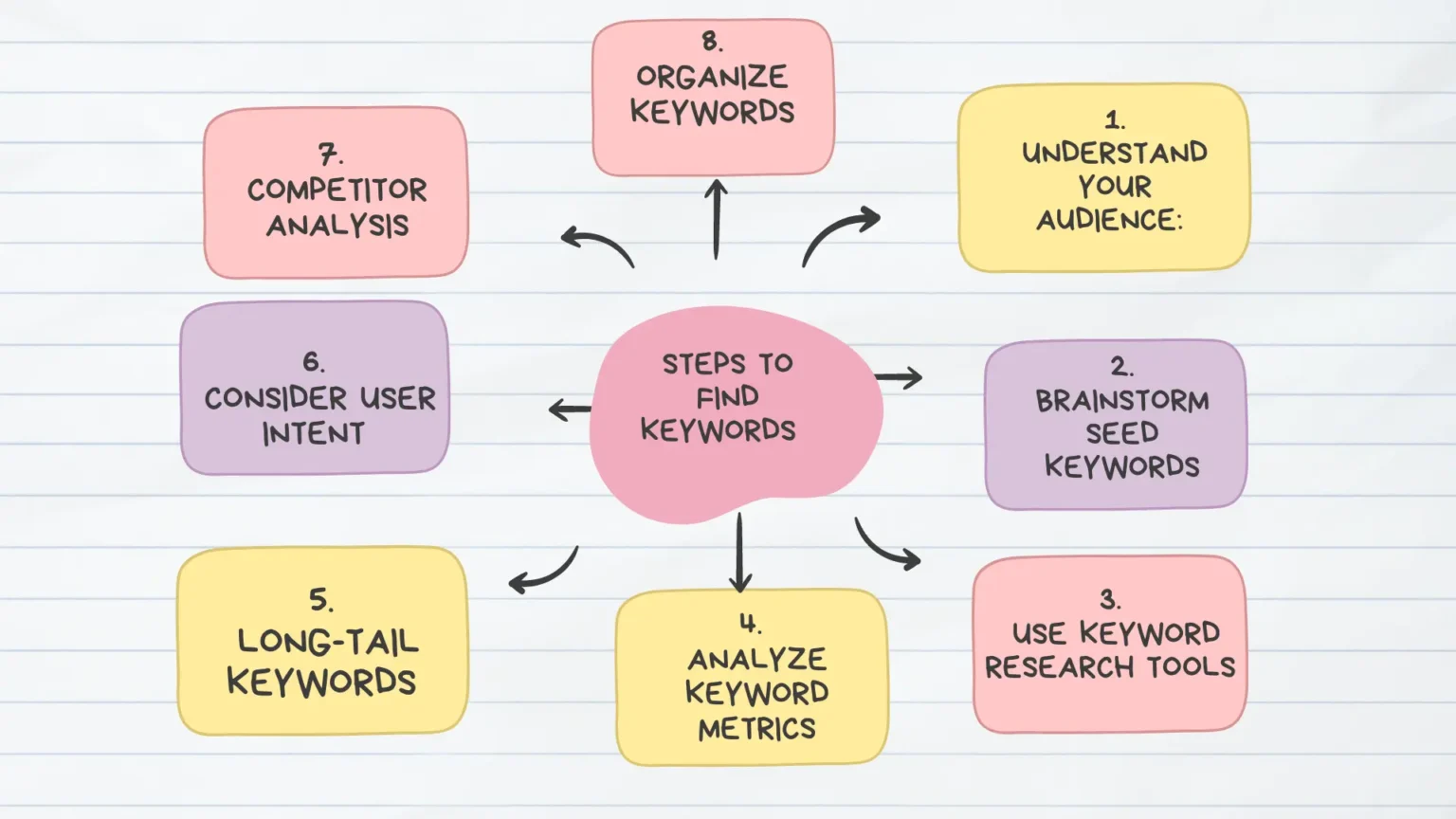
Conclusion
To conclude, keyword research is one of the most systematic processes that helps you to know what your target audience demands. Moreover, it’s also a crucial step because if you do not do keyword research according to your user then your website will be affected. if you did research critically there is a high chance of yours to rank.
